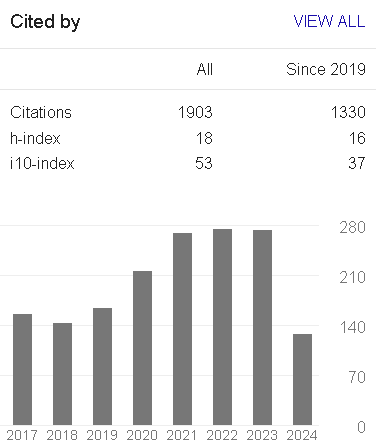Student Engagement in a Blended Learning Environment
Keywords:
Student engagement, Blended Learning, LMS, MOODLEAbstract
To keep connections and engage the students for learning educators are adapting to different learning strategies. Use of powerful technology resources like electronic Learning Management Systems (LMS) is one of them. This paper gives an overview of student engagement in a LMS based environment.
References
. Ann Brown and Jordy Johnson (2007).from http://www.microburstlearning.com.
. Australian survey of Student Engagement,(AUSSE,2009) from http://www.acer.edu.au/ausse
. Blackboard. (2003)." Blackboard Learning System ", from www.blackboard.com.
. Beer, Clark & Jones, "Indicators of engagement ", Proceedings ascilite Sydney 2010
. Coates H (2005). Leveraging online learning to enhance campus-based Student Engagement. Educause Quarterly I, 66-68
. Coates, H. (2006). "Student Engagement in Campus-based and Online education ", http://www.cqu.eblib.com.ezproxy.cqu.edu.au/EBLWEB/patron
. Coates, H. (2007). A model of online and general campusbased student engagement, Assessment & Evaluation in Higher Education, 32(2), 121-141
. Coates, H., James, R., & Baldwin, G. (2005). A critical examination of the effects of learning management systems on university teaching and learning. [Journal Article]. Tertiary education and management, 11(2005), 19-36.
. Chapman, E. (2003) "Assessing student engagement rates," ERIC Clearinghouse on Assessment and Evaluation. ERIC identifier: ED482269.
.Chen, P.S.D.,Gonyea,R.,& Kuh,G.(2008). Learning at a distance. Journal of online education,4(3).http://innovateonline.info/index.php?view=article&id=438&action=login
.Coursework (2003) from http://coursework.standford.edu
.Davis. T. M. and Murrell, P.H.(1993).Turning Teaching into Learning: The Role of Student Responsibility in the Collegiate Experience. Washington, DC: ERIC Clearinghouse on Higher Education
.Dawson, S., Macfadyen, L., & Lockyer, L. (2009). Learning or performance: Predicting drivers of student motivation. Paper presented at the Same places, different spaces. Proceedings ascilite Auckland 2009, Auckland.
.Donald Markwell (2007), A large and liberal education': higher education for the 21st century, Melbourne: Australian Scholarly Publishing & Trinity College, University of Melbourne
.Douglas, I., & Alemanne, N. D. (2007). Measuring Student Participation and Effort. Paper presented at the International Conference on Cognition and Exploratory Learning in Digital Age, Algarve, Portugal.
.Fletcher, A. (2005) Guide to Students as Partners in School Change. Olympia, WA: SoundOut. Retrieved 2/20/08.
.Frand, J.L. (2000). The Information Age Mindset: Changes in Students and Implications for Higher Education. Educause Review 35(5), 14–24.
.Green, K.C. & Gilbert, S.W. (1995). Great Expectations: Content, Communications,Productivity, and the Role of Information Technology in Higher Education. Change 27(2), 8–18.
.Heidi Hayes Jacobs,"Curriculum 21: Essential Education for a Changing World. Creating Learning Connections with Today‘s Tech-Savvy Student", Bill Sheskey. ASCD, 2010.
."IBM Lotus. (2003). Lotus Virtual Classroom ", from http://www.lotus.com/products/
.Krause, K.-L., & Coates, H. (2008). Students‘ engagement in first-year university. Assessment & Evaluation in Higher Education, 33(5), 493 – 505.
.Kuh, G. D.,& Hu, S. (2001). The effects of student-faculty interaction in the 1990s. The Review of Higher Education, 24,309-332.
.Kuh, G. D. (2001). Assessing What Really Matters to Student Learning. Inside the national survey of student engagement. http://cpr.iub.edu/uploads/Assessing_What_Really_Matters_To_Student_Learning_(Kuh,%202001).pdf
.http://www.kesdeefoundation.org/ dt.18-11-13
.Lopes, V. M. (2008). Course Management Systems and Campus-Based Learning. Seneca College.
.Mandernach, B. (2009). Three Ways to Improve Student Engagement in the Online Classroom. Online Classroom Ideas for Effective Online Instruction, (March), 1-2.
.Mohammad Mohammad, The Impact of e-Learning and eTeaching, World Academy of Science, Engineering and Technology, 62, 2012
.National survey of Student Engagement,(NSSE,2000,2012) from http://nsse.iub.edu/
.Open Knowledge Initiative (OKI). (2003). Open Knowledge Initiative, from http://web.mit.edu/oki/.
.Paul Bogdan,"Student-Centered Learning Environments: How and Why" , http://www.edutopia.org/blog/studentcentered-learning-environments-paul-bogdan
.Prince,M 2004.Does active Learning work? A review of the research Journal of Engineering Education 93 (3):223-31
.S. Arulchelvan,"The Effectiveness of E-LMS on Performance of Indian Rural Schools: A Case from a Developing Country", CONTEMPORARY EDUCATIONAL TECHNOLOGY,2012, 3(1), 1-16 Anna University, India
.Sakai Project (2004). The Sakai Project, from http://www.sakaiproject.org/.
.Selim, H.M. (2007) ‗Critical success factors for e-learning acceptance: confirmatory factor models‘, Computers and Education, Vol. 49, No. 2, pp.396–413.
.WBT Systems. (2003). TopClass/FirstClass, from http://www.wbtsystems.com/.
Downloads
Published
How to Cite
Issue
Section
License
Copyright (c) 2013 COMPUSOFT: An International Journal of Advanced Computer Technology

This work is licensed under a Creative Commons Attribution 4.0 International License.
©2023. COMPUSOFT: AN INTERNATIONAL OF ADVANCED COMPUTER TECHNOLOGY by COMPUSOFT PUBLICATION is licensed under a Creative Commons Attribution 4.0 International License. Based on a work at COMPUSOFT: AN INTERNATIONAL OF ADVANCED COMPUTER TECHNOLOGY. Permissions beyond the scope of this license may be available at Creative Commons Attribution 4.0 International Public License.


